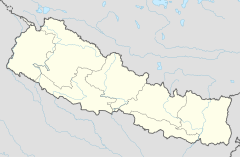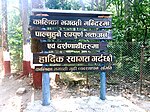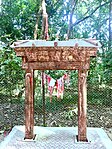| Baglung Kalika Bhagawati Temple बाग्लुङ कालिका भागवती मन्दिर | |
|---|---|
 Kalika Bhagwati Temple, Baglung Kalika Bhagwati Temple, Baglung | |
| Religion | |
| Affiliation | Hinduism |
| District | Baglung |
| Province | Gandaki |
| Deity | Kali |
| Festivals | Navaratri, Teej, Chaite Dashain |
| Location | |
| Location | Baglung |
| Country | Nepal |
 | |
| Geographic coordinates | 28°15′21.24″N 83°36′48.88″E / 28.2559000°N 83.6135778°E / 28.2559000; 83.6135778 |
| Architecture | |
| Type | Pagoda |
Kalika Bhagawati Temple, also known as Baglung Kalika Bhagawati Temple, is a significant Hindu temple located south-east of the town of Báglung in western Nepal. It is situated on the southern banks of the Kali Gandaki River.
The presiding deity of the temple is Kalika (or Kali), one of the fiercest forms of Shakti, the consort of Shiva. Kalika is one of the main goddess for the Shaiva sect.
The temple courtyard has four entrances in each of the cardinal directions. The temple compound contains a sprawling collection of various other small temples dedicated to Shiva, Radha Krishna, Lakshmi Narayan and others.
The major festival of the temple, Chaite-Dashain, is held on the eighth day of the Shukla Paksha (bright lunar fortnight) of the month of Chaitra, with thousands of devotees visiting. The devotees light oil lamps, perform pooja, rituals and get married with the belief of receiving the Devi's blessings. The other major festival is that of Dashain, which runs from the Shukla Paksha of the month of Ashwin and ending on the Purnima (full moon).
According to local folklore the King of Parbat District, Pratap Narayan Singh Malla, received an idol of goddess Kalika as part of the dowry in his marriage with King Manimukunda Sen's daughter. Whilst returning to his residence after the marriage ceremony, the bride, groom and others from the marriage procession took shelter in the forest. On the following day, not a single person was able to move the idol, so, the king constructed a temple on that spot.
Traditionally devotees practices live animal sacrifices at the temple in the belief that this would enable their wishes to be fulfilled. On 13 April 2016, the sacrificing of pigeons was stopped on the basis that pigeon represents a symbol of peace. The pigeons are instead released from within the temple's grounds.
Gallery
Baglung Kalika Bhagawati Temple scenes-
 Front view of Baglung Kalika Bhagawati Temple
Front view of Baglung Kalika Bhagawati Temple
-
 Marketplace to buy Puja materials
Marketplace to buy Puja materials
-
 A Board welcomes all the devotees and visitors in Temple
A Board welcomes all the devotees and visitors in Temple
-
 Copper Bell on the way to Temple
Copper Bell on the way to Temple
-
 Way to Temple through forest
Way to Temple through forest
-
 Side View of Kalika Bhagawati Temple through forest
Side View of Kalika Bhagawati Temple through forest
-
 View point Located on back side of Temple
View point Located on back side of Temple
References
- Amātya, Sāphalya (2014). Cultural Tourism in Nepal. Ministry of Culture, Tourism & Civil Aviation. p. 123.
- "Baglung Kalika Temple: Place to Get Siddhi (Knowledge)". Nepalya Times. 19 December 2018. Archived from the original on 31 December 2018. Retrieved 3 January 2019.
- Nepal Yearbook. Kathmandu, Nepal: Institute for Integrated Development Studies. 2000. p. 99.
- "Baglung Kalika". The Himalayan Times. 9 October 2016. Archived from the original on 4 January 2019. Retrieved 2 January 2019.
- "Baglung Kalika Temple". Boss Nepal Online. Archived from the original on 18 November 2018. Retrieved 2 January 2019.
- "Huge number of devotees flock Kalika temple in Baglung". ImageKhabar. 17 October 2018. Archived from the original on 3 January 2019. Retrieved 3 January 2019.
- Magar, Sangam Gharti (28 March 2018). "Charm of Resham Baglung Kalika". My Republica. Retrieved 2 January 2019.
- Samiti, Rastriya Samachar (15 March 2016). "Pigeon sacrifice to be banned at Baglung Kalika temple". The Himalayan Times. Retrieved 2 January 2019.